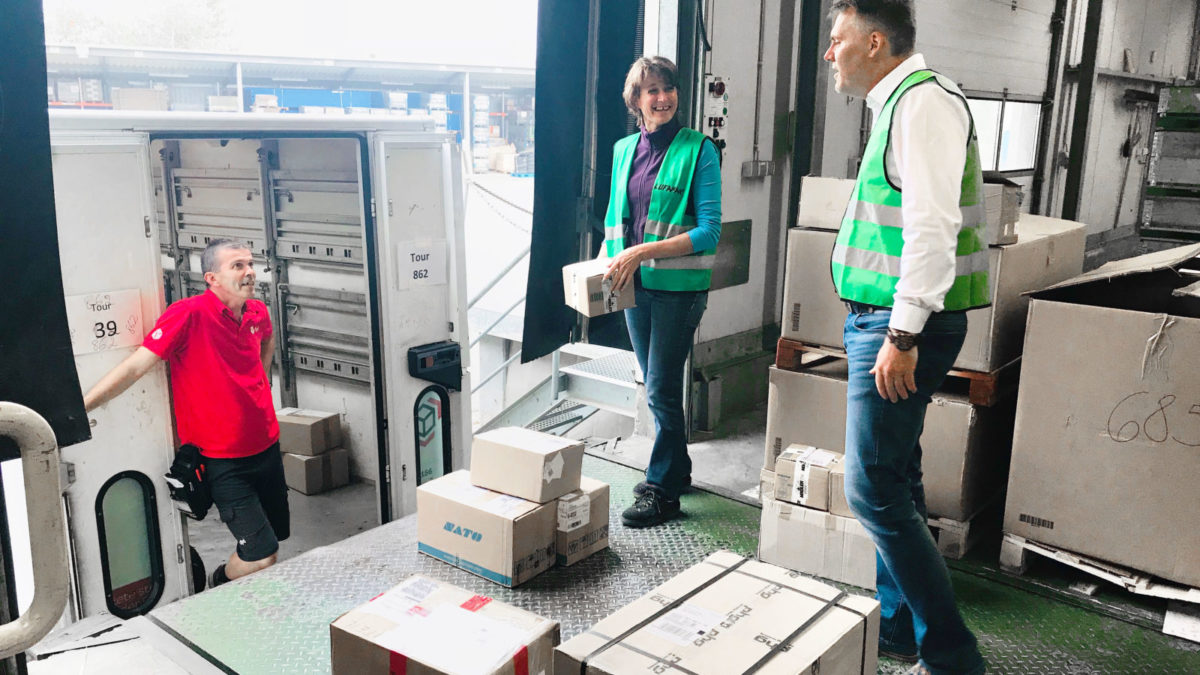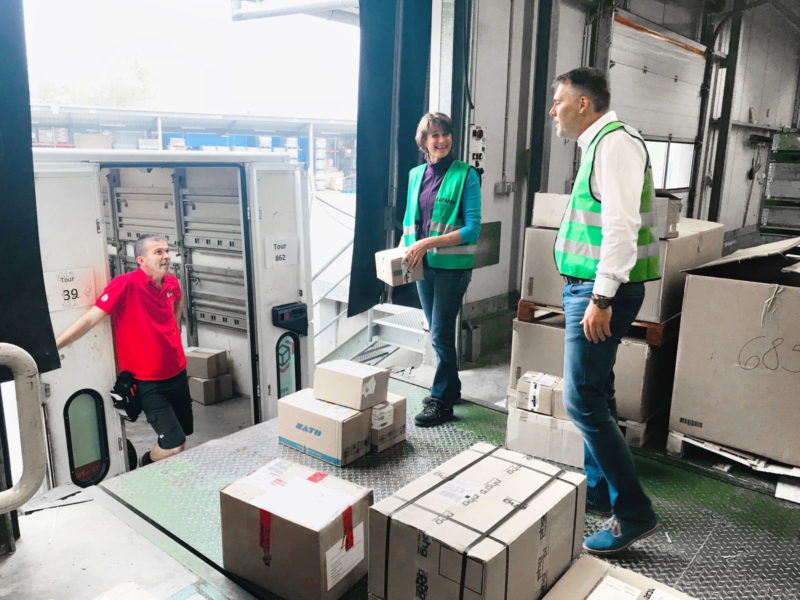sales@lufapak.de +49 2631/384-0 Contactform
What is a freight forwarder?
A freight forwarder is a specialised service provider that focuses on organising and handling the transport of goods. In essence, freight forwarders take on the complex task of transporting goods efficiently and safely from A to B. This includes not only the actual transport, but also planning the routes, selecting suitable means of transport and coordinating all parties involved.
Freight forwarding companies act as a link between shippers, consignees and transport companies. They optimise supply chains by combining different transport options and overcoming logistical challenges. To do this, modern freight forwarding companies use advanced technologies for tracking shipments and optimising processes.
The services provided by a freight forwarder often go beyond pure transport. Many freight forwarding companies offer additional services such as warehousing, packaging, customs clearance and insurance services. This makes them comprehensive logistics service providers that provide customised solutions for a wide range of transport needs.
Freight forwarders play a key role in the global economy by enabling the smooth movement of goods, thus supporting trade and production. Their expertise is particularly valuable for complex or international shipments, where legal and logistical hurdles need to be overcome.
The freight forwarder: a transport industry merchant
The freight forwarder is at the centre of the freight forwarding business and is defined in the German Commercial Code as a merchant in the transport industry. This legal classification underlines the economic importance and the special requirements of freight forwarders. They are not only logistics experts, but also accomplished business people with extensive industry knowledge.

Freight forwarders are characterised by their ability to plan and control complex transport chains. They have a broad network of contacts in the transport industry and are familiar with the special features of different modes of transport, such as road, rail, air and water. This expertise enables them to find the optimal transport solution for every consignment.
In their day-to-day business, freight forwarders juggle a multitude of tasks. They negotiate contracts, calculate prices, organise routes and solve any problems that arise. They must always keep the legal framework in mind, especially in the case of international shipments, where different customs and trade regulations must be observed.
The role of a freight forwarder requires not only professional expertise but also strong communication skills. They are the point of contact for customers, transport companies and authorities and must be able to mediate and coordinate effectively. In an increasingly digitalised industry, successful freight forwarders also rely on modern technologies to optimise processes.
Core competencies of a freight forwarding company
The core competencies of a freight forwarding company include a wide range of skills and services. First and foremost is transport organisation. Freight forwarding companies plan and coordinate the entire transport process, select the appropriate modes of transport and optimise routes for maximum efficiency. They take into account factors such as costs, time and special requirements of the goods to be transported.
Another core competence is shipment management. Freight forwarders monitor the goods’ journey from sender to recipient and ensure that all the necessary documents are correct and complete. This is particularly important for international shipments, where complex customs formalities need to be completed. Many freight forwarding companies also offer warehousing and order picking to enable seamless integration of transport and storage.
The ability to use resources efficiently is also a core competence. Freight forwarders consolidate shipments from different customers to minimise empty runs and optimise costs. This requires a high degree of planning expertise and flexibility. In addition, many freight forwarders offer value-added services such as packaging, insurance or specialised transport for dangerous goods or temperature-sensitive goods.
In modern logistics, IT expertise is also of great importance. Freight forwarding companies use advanced software solutions to track shipments in real time, optimise processes and provide customers with up-to-date information. This technological expertise enables freight forwarders to remain competitive in the rapidly changing logistics industry.
Types of freight forwarders
The world of freight forwarding is diverse and specialised. Depending on their focus and range of services, different types of freight forwarders can be distinguished. General freight forwarders offer a wide range of transport services for a variety of goods and industries. They are flexible and can adapt to different customer requirements.
In addition, there are highly specialised freight forwarders that focus on specific types of goods or types of transport. Examples include furniture removal companies that specialise in the transport of household items, or hazardous goods transporters that have the necessary expertise and permits for the transport of hazardous substances.
Another important category is express delivery companies, which specialise in time-critical shipments. They guarantee short delivery times and often offer additional services such as same-day delivery. By contrast, heavy haulage companies specialise in the transport of oversized or particularly heavy goods, which requires special vehicles and permits.
The size of freight forwarding companies varies greatly, from small, local businesses to global logistics corporations. While smaller freight forwarders can often respond more flexibly to individual customer requests, large freight forwarding companies have the advantage of an extensive network and the ability to handle complex international shipments.
International freight forwarding
International freight forwarders specialise in cross-border transport and play a key role in global trade. These freight forwarding companies have the necessary expertise to transport goods efficiently and legally across national borders. They are adept at navigating the challenges of different customs regulations, trade laws and logistical requirements in different countries.
An international freight forwarder must have a wide range of skills. These include in-depth knowledge of international trade agreements, customs regulations and documentation requirements. They organise multimodal transports that optimally combine different modes of transport, such as ship, plane, train and truck, to optimise time and costs.
International freight forwarders often offer comprehensive service packages. In addition to the actual transport, these can also include customs clearance, insurance, storage in bonded warehouses and the processing of export documents. Many international freight forwarders have a global network of partners and branches, enabling seamless door-to-door transport.
In an increasingly interconnected global economy, international freight forwarders are becoming ever more important. They enable companies to tap into new markets and design efficient global supply chains. They are increasingly relying on digital solutions to optimise processes and provide customers with real-time information on the status of their shipments.
Freight forwarding for private customers
While freight forwarders have traditionally worked primarily with businesses, the area of freight forwarding for private customers is becoming increasingly important. These specialised services are aimed at private individuals who need assistance with larger shipments, such as moving house, shipping furniture or other bulky goods.
Private customers benefit from the expertise and resources of professional freight forwarders without having to have vehicles or logistical know-how themselves. Private customer freight forwarding often offers complete solutions that, in addition to transport, can also include packaging, loading and unloading, and short-term storage. This is particularly advantageous when moving house or shipping valuable or fragile items.
An important aspect of freight forwarding for private customers is the individual advice. Freight forwarders help in selecting the appropriate means of transport, planning the optimal shipping time and clarifying insurance issues. They often offer flexible solutions that are tailored to the specific needs and schedule of the customer.
In times of growing e-commerce, more and more private customers are also using freight forwarding services to send or receive goods that cannot be sent via conventional parcel services due to their size or weight. Freight forwarders are responding to this trend with user-friendly online booking platforms and transparent pricing models that make the service attractive and accessible to private individuals.
Services of a freight forwarding company
Freight forwarding companies offer a comprehensive portfolio of services that goes far beyond the mere transport of goods. The focus is on holistic logistics planning and execution. Freight forwarders take over the complete organisation of the transport chain, from pick-up at the shipper to delivery at the consignee. They select the optimal combination of means of transport and routes to ensure efficiency and cost-effectiveness.
A key component of the range of services is shipment tracking. Modern freight forwarding companies use advanced tracking systems that enable customers to track the current status of their shipment in real time. This increases transparency and enables precise planning of downstream processes.
Many freight forwarders also offer warehousing and distribution services. They have their own storage space or cooperate with specialised logistics centres. This enables flexible warehousing and fast distribution of goods, which is particularly advantageous for companies with fluctuating demand.
Another important aspect is customs clearance for international shipments. Freight forwarders have the necessary know-how to efficiently handle customs formalities and minimise delays at borders. They also advise their customers on export documentation and help them comply with international trade regulations.
Transport organisation
Organising transport is the core service of a freight forwarder. This is where the core competence of freight forwarders lies in planning and coordinating complex logistics processes. The task is to find the optimal transport solution for each consignment, taking into account factors such as costs, time, security and special requirements of the freight.
Freight forwarders first analyse the characteristics of the goods to be transported, such as weight, volume and any special features (e.g. hazardous or temperature-sensitive goods). Based on this, they select the appropriate means of transport – be it truck, train, ship or plane. Different modes of transport are often combined to maximise efficiency.
An important aspect of organising transport is route planning. Freight forwarders use modern software solutions to determine the most efficient routes, taking into account factors such as traffic volume, construction sites and weather conditions. For international shipments, border crossings and customs clearance also play an important role in planning.
Coordinating all parties involved is another core task. Freight forwarders are in constant contact with shippers, consignees, transport companies and authorities to ensure a smooth process. They respond flexibly to unforeseen events and quickly find solutions to problems or delays.
Warehousing and order picking
In addition to transport, many freight forwarders offer comprehensive services in the areas of warehousing and order picking. These complementary services enable customers to obtain all their logistics from a single source and benefit from optimised, integrated processes. Freight forwarding companies often have their own storage space or cooperate with specialised logistics centres to provide flexible storage capacity.
Warehousing by freight forwarders involves more than just the storage of goods. Modern warehousing concepts include efficient inventory management, in which incoming, outgoing and stock goods are recorded and monitored in real time. This enables precise control of warehouse stocks, helps to avoid overstocking and enables just-in-time deliveries.
A central aspect of warehousing is order picking – the process of compiling shipments from the warehouse stock in accordance with customer orders. Forwarding companies rely on advanced technologies such as barcode scanning or RFID to ensure error-free and efficient order processing. Voice picking or pick-by-light systems support employees in quickly and accurately compiling the goods.
Many freight forwarders also offer value-added services in the warehouse, such as repackaging, labelling or quality control of goods. These additional services enable customers to streamline their processes and concentrate on their core business, while the freight forwarder takes over the entire logistics chain from incoming goods to shipping.
Customs clearance
Customs clearance is a crucial part of the services provided by international freight forwarders. In a globalised economy in which goods regularly cross national borders, the correct and efficient handling of customs formalities plays a key role in ensuring the smooth flow of international transport. Freight forwarders act as experts and intermediaries between their customers and the customs authorities.
The complexity of customs clearance arises from the different customs regulations and import rules of different countries. International freight forwarders have extensive knowledge of these regulations and always stay up to date on changes. They advise their customers on topics such as customs tariffs, import restrictions and required documents to avoid delays or legal issues.
An important aspect of customs clearance is the correct classification of goods. Freight forwarders support their customers in determining the correct customs tariff numbers, which are crucial for calculating customs duties and taxes. They also help with the creation and verification of all necessary customs documents such as commercial invoices, certificates of origin or preference certificates.
Many freight forwarding companies also offer customs optimisation services. These include the use of tariff concessions, the application for preferential treatment or the use of bonded warehouses to avoid or defer customs payments. This expertise can provide customers with significant cost savings and competitive advantages.
How to hire a freight forwarder
Hiring a freight forwarder is an important step in organising efficient freight transport. Whether you are a company that regularly ships goods or a private individual who needs a one-time transport, the process follows similar steps. First, it is important to clearly define your specific requirements. This includes information about the type, quantity and nature of the goods to be transported, desired delivery times, and the start and destination locations.
With this information, you can contact various freight forwarders and request quotes. Many freight forwarding companies today offer online forms or platforms that you can use to quickly and easily submit a request. Alternatively, you can also contact them by phone or email. For more complex requirements, a personal meeting is often recommended to clarify all the details.
After you have received offers, you should compare them carefully. When doing so, don’t just look at the price, but also at the scope of services, the additional services offered and the reputation of the freight forwarder. For regular shipments, it may make sense to conclude framework agreements with a freight forwarder that offer more favourable conditions and prioritised processing.
When the order is finally placed, it is important to record all the details in writing. In addition to the transport details, this also includes agreements on insurance, liability issues and any special services. A reputable freight forwarding company will provide you with all the necessary information transparently and guide you through the entire booking process.
Selecting the right freight forwarding partner
Choosing the right freight forwarding partner is crucial to the success of your logistics processes. When selecting a freight forwarder, you should consider various criteria to ensure that the company meets your specific requirements. One important factor is the experience and specialisation of the freight forwarding company. Check whether the freight forwarder has experience with the type of goods you want to transport and whether it has the necessary resources and expertise for your specific transport requirements.
The geographical coverage of the freight forwarder is another important aspect. If you are planning international shipments, you should choose a freight forwarder that has an appropriate global network and expertise in customs clearance. For local or national shipments, a freight forwarder with regional roots can often offer more flexible and cost-effective solutions.
Technological expertise is essential in modern logistics. Make sure that the shipping company has modern tracking systems that provide you with real-time information about the status of your shipments. The ability to process orders and communicate digitally can also make working together much easier.
In addition to these hard factors, soft factors also play a role. These include the quality of customer service, the speed of response to enquiries or problems and the company’s general communication culture. A personal meeting or a test phase can help to better assess these aspects and decide whether the chemistry is right.
The forwarding order
The shipping order is the central document in the cooperation between you and the freight forwarder. It defines all the important details of the transport and serves as the legal basis for the service. When creating a shipping order, it is important to provide all the relevant information accurately and completely to avoid misunderstandings and delays.
A typical shipping order starts with the contact details of the sender and recipient. In addition to names and addresses, this includes telephone numbers and e-mail addresses for queries or notifications. It is particularly important to provide precise details of the goods to be transported. These include the type, quantity, weight and dimensions of the goods, as well as any special features such as hazardous or temperature-sensitive goods.
The order should also include clear information about the desired delivery dates. A distinction must be made between the pick-up date at the shipper and the desired delivery date at the consignee. Special requirements such as fixed time slots for delivery or the need for notification should also be noted.
Another important part of the freight forwarding order is agreements on additional services. These may include packaging services, the handling of customs formalities or special insurance services. The agreed prices and payment terms should also be included in the order.
Challenges and trends in the freight forwarding industry
The freight forwarding industry is facing a number of challenges that also offer opportunities for innovation and growth. A key issue is the increasing digitalisation, which is fundamentally changing traditional business models and processes. Freight forwarders must adapt to remain competitive and meet rising customer expectations. The integration of digital technologies into all areas of the logistics chain is becoming increasingly important, from order processing and shipment tracking to route optimisation.
Another important trend is the growing importance of sustainability and environmental protection. Customers and regulatory authorities are increasingly demanding more environmentally friendly transport solutions. In response, freight forwarders are optimising routes to reduce emissions, using alternative drive technologies and developing green logistics concepts.
The globalisation of markets presents freight forwarders with the challenge of managing increasingly complex international supply chains. This requires not only logistical know-how but also a deep understanding of the different legal and cultural conditions in various countries. At the same time, globalisation offers opportunities for growth and expansion into new markets.
Another challenge is the increasing shortage of skilled workers in the logistics industry. Freight forwarders need to find innovative ways to attract and retain qualified employees. This includes developing attractive training and career opportunities and creating a modern working environment that meets the expectations of younger generations.
Digitalisation in logistics
Digitalisation is revolutionising the logistics industry and fundamentally changing the way freight forwarders operate. Modern technologies make it possible to optimise processes, increase efficiency and offer new services. A key aspect of digitalisation is the implementation of advanced IT systems that enable seamless integration of all logistics processes.
One of the most important trends in this area is the use of artificial intelligence (AI) and machine learning. These technologies are used to optimise route planning, predict delivery times and identify potential disruptions in the supply chain at an early stage. AI-based systems can analyse large amounts of data and gain valuable insights for process optimisation.
Blockchain technology is also increasingly finding its way into the logistics industry. It promises increased transparency and security in the supply chain by enabling unalterable and traceable records of all transactions and movements. This can be particularly advantageous for complex international shipments involving many different parties.
Another important aspect of digitalisation is the increasing connectivity of vehicles and cargo carriers in the sense of the Internet of Things (IoT). Sensors and GPS trackers enable real-time monitoring of shipments, which not only increases transparency for customers but also allows proactive control of logistics processes. This enables freight forwarders to react faster to delays or unforeseen events.
Sustainability in freight transport
Sustainability in freight transport has become a key issue in the freight industry. In the face of growing environmental awareness and increasing regulatory requirements, freight companies are being challenged to develop more environmentally friendly transport solutions. This includes not only reducing CO2 emissions, but also minimising other environmental impacts such as noise and air pollution.
Optimising transport routes and capacities is an important approach to increasing sustainability. Modern software solutions enable freight forwarders to bundle loads more efficiently and minimise empty runs. By intelligently combining different modes of transport in intermodal transport, more use can also be made of more environmentally friendly transport options such as rail or inland waterways.
The use of alternative drive technologies plays an increasingly important role in the sustainable design of freight transport. Freight companies are investing more in electric vehicles for local transport and in trucks with hydrogen or hybrid drives for longer distances. These technologies not only help to reduce CO2 emissions, but can also lead to long-term cost savings, especially in the face of rising fuel prices and stricter environmental regulations.
Another aspect of sustainability in freight transport is optimising packaging. Freight forwarders work with their customers to develop environmentally friendly packaging solutions that reduce the amount of material used while ensuring the protection of goods. Reusable transport containers and recyclable packaging materials are becoming increasingly important.
In addition, many freight forwarding companies are focusing on certifying their sustainability efforts. Environmental management systems according to ISO 14001 or special certifications for sustainable transport, such as the ‘Lean and Green Award’, are used to document their own progress and communicate it to customers.
The importance of freight forwarders for the global economy
Freight forwarders play a crucial role in the global economy by acting as architects of efficient supply chains. In a world in which international trade is constantly increasing and companies are operating globally, the services of freight forwarders are essential for the smooth functioning of production and trade processes. They enable companies to move raw materials and finished products across national and continental borders, thus benefiting from global procurement and sales markets.
The expertise of freight forwarders in designing complex logistics chains contributes significantly to increasing efficiency and optimising costs. By intelligently combining different modes of transport and exploiting synergies, they can shorten transport times and reduce costs at the same time. This enables companies to increase their competitiveness and respond flexibly to market changes.
In a globalised economy, freight forwarders also serve as important intermediaries between different cultures and legal systems. Their knowledge of international trade regulations, customs requirements and local conditions is invaluable to companies operating in foreign markets. Freight forwarders help overcome legal and administrative hurdles and ensure that international transactions run smoothly.
The importance of freight forwarders is also reflected in their role as drivers of innovation in the logistics industry. By continuously developing their services and using the latest technologies, they help to steadily improve the efficiency and sustainability of the global movement of goods. This has a positive impact on the economy as a whole by reducing costs, increasing the availability of goods and opening up new business opportunities.
Last but not least, freight forwarders play an important role in times of crisis and unforeseen events. Their ability to respond quickly to disruptions in supply chains and find alternative transport routes contributes significantly to the resilience of the global economy. This became particularly clear during the COVID-19 pandemic, when freight forwarders played a major role in maintaining the supply of essential goods while also overcoming new challenges such as contactless deliveries.
Contact us now and get advice



